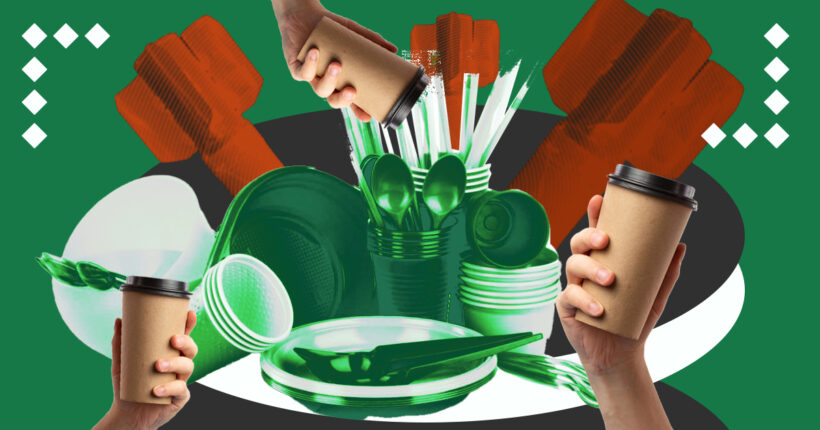
What is the problem?
Despite the sanctions, Russia continues to receive huge revenues from selling oil and gas — currently, they make up about a third of the Russian budget. Russia uses these funds to produce or buy shells and missiles that kill, destroy, and make Ukrainian cities and villages unlivable.
However, no one thinks that transparent packaging for a cake or detergent in a plastic bottle could have anything to do with war or that the money you paid for a disposable cup of delicious coffee could also be part of the financing of Russia's war against Ukraine.
What is the solution?
Before the war, the task of every conscious person was to limit and, ideally, completely abandon the use of single-use plastic to preserve the environment. Today, one more was added to the global causes: eliminating plastic can help exhaust the aggressor country, bringing Ukraine's victory closer.
Rubryka explains how plastic is connected to Russian fossil fuels and what can be done to reduce disposable containers and packaging.
How does it work?
The connection between Russian fuel and plastic
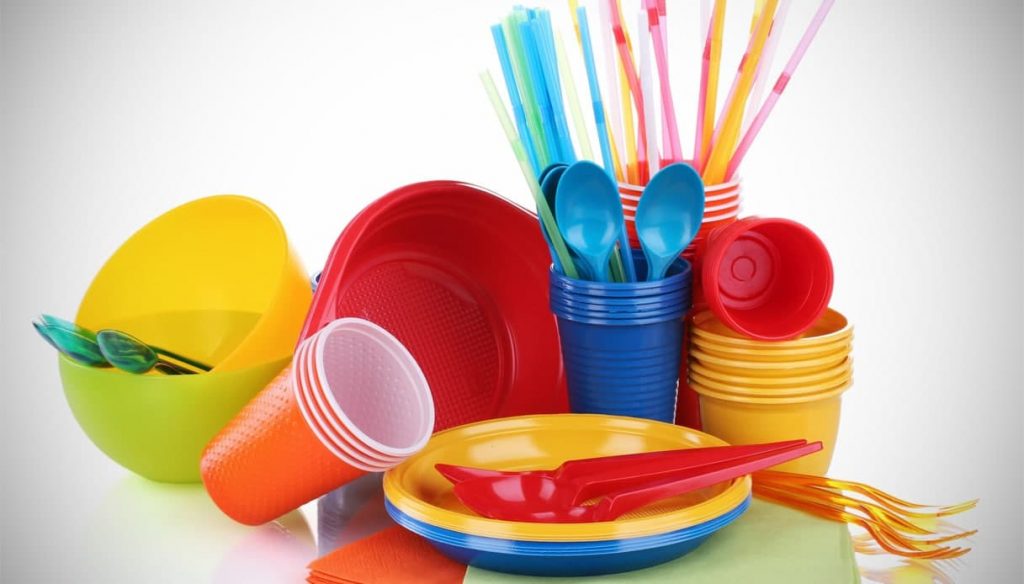
Fossil fuels are the raw material for disposable tableware and packaging.
Over the past 50 years, the world's production of plastic has increased 20 times. By 2035, it should double again. In 2019 alone, over 130 million tons of single-use plastic were taken to landfills. But where does it come from?
Along with synthetic fertilizers and fibers, plastic is a petrochemical product. That is, it is made from fossil fuels, mainly oil and gas.
Plastic production is not only one of the fastest-growing sources of pollution but also the source of funding for the worst war since World War II. The Break Free From Plastic study revealed that the world's plastic is made mainly from Russian fossil fuels and thus indirectly finances Russia's armed aggression against Ukraine.
Oil and gas are essential pillars of Russia's economy. So, even in 2020, 39% of gas and 23% of oil came from Russia to EU countries. The full-scale invasion of the Russian Federation into Ukraine dramatically changed the game rules in this sector. Since the beginning of the war, the European Union has been negotiating and seeking new trade agreements to ensure gas supply during the cold season. These are the deliveries from the USA and other countries, such as Senegal or Venezuela. According to official data, Western Europe has already completely freed itself from the direct supply of gas and oil from the Russian Federation. However, some Russian fossil fuels still enter the EU through foreign refineries. Thanks to this loophole, Russia earned a billion euros in 2023.
Today, industrial consumption of Russian oil and gas continues even in those countries that openly oppose Russian aggression, particularly due to the production of excess single-use plastic and packaging.
Supermarkets (without) plastic
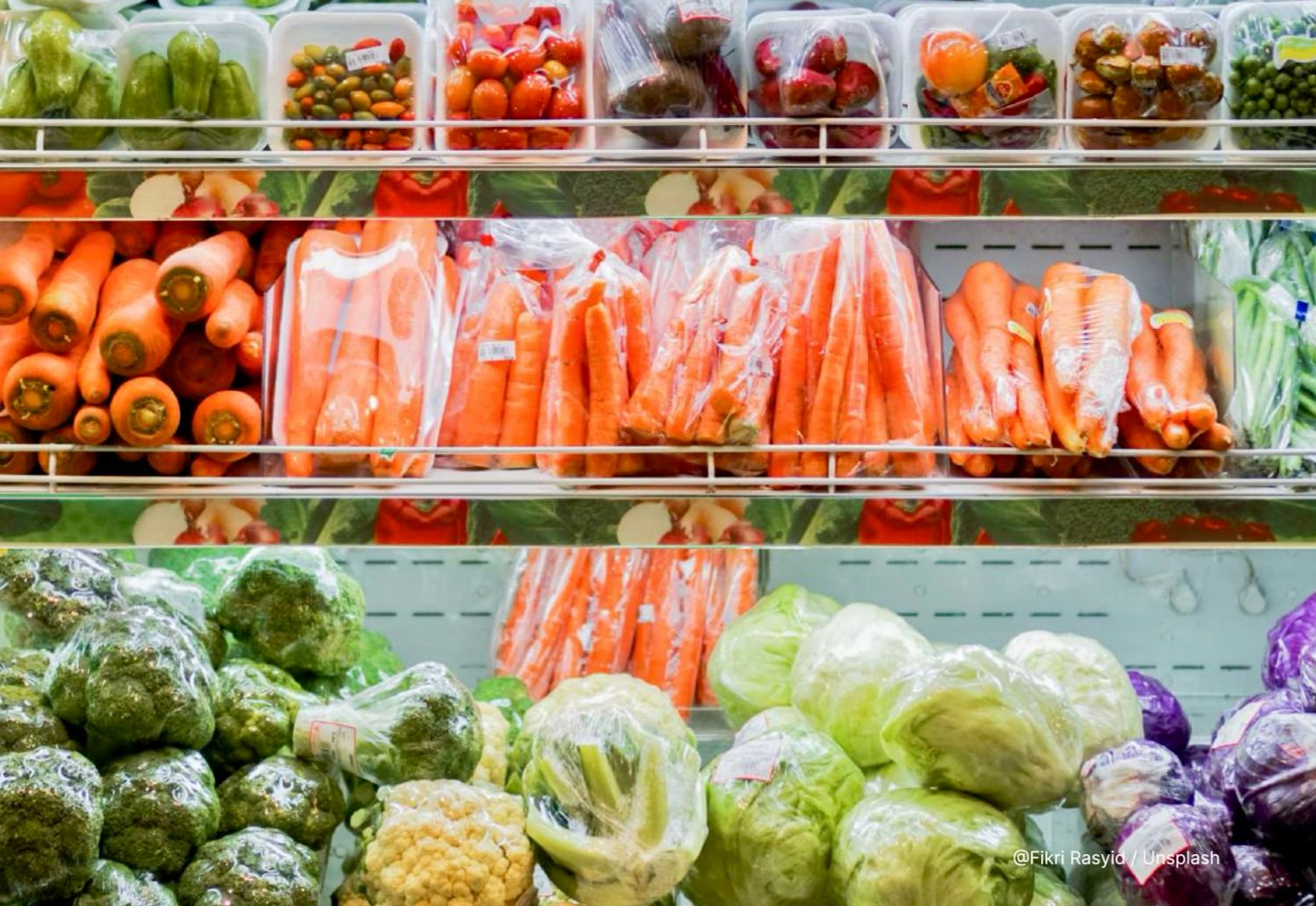
Excessive packaging is a "disease" of modern supermarkets.
In the summer of 2022, the Zero Waste Society NGO, as part of the project "European Union for the Sustainability of Civil Society in Ukraine," conducted a study Supermarkets (Without) Plastic.
Experts focused on supermarkets because they are the ones that pollute the environment the most with plastic. Eco-activists believe that with a total turnover of about $ 586,417,200,000,00 billion per year, Ukraine's trade chain and retail sector have the resources to act and bear responsibility for the fight against excessive use and pollution of plastic. At the same time, located at the intersection between consumers and suppliers, supermarkets and grocery stores can lead the transition from a linear economy and disposable society to circular production and consumption systems. This way, they can significantly reduce their plastic footprint and encourage brands and customers to do the same.
The basis of the business model of large grocery chains is the dependence on single-use packaging, particularly plastic. The Russian military machine is financed, among other things, by the export of Russian fossil fuels and other mined materials, which are used to make plastic packaging, fertilizers, and synthetic textiles. "Helping Ukraine to get closer to victory in the war with Russia should be an extremely important motivation for abandoning the use of single-use plastic packaging. This can be done by further reducing dependence on fossil resources, from which most plastic products are made," says Sofiia Sydorenko, head of the Ukrainian Zero Waste Alliance.
Achieving this goal is possible by moving to business models based on multiple uses and rejecting unnecessary packaging of goods. The issue of petrochemical products is significant in this problem. Today, this industry is the biggest driver of increased demand for oil and gas. One of the most effective ways to improve the situation is to legislate ways to reduce the consumption of one of the leading petrochemical products — plastic.
This issue has been ignored for years during public discussions in the EU regarding energy and climate, even despite the climate crisis and now the energy crisis. However, this year, the ice finally broke. The EU decided to ban single-use plastic packaging for fresh fruits and vegetables and toilet accessories in hotels and fast food.
The main aim of the new legislation is to combat the amount of packaging waste in the EU, so bans should be introduced by 2030. The document's drafters call the agreement historic, calling on industry sectors and member states to join efforts to combat excessive packaging.
According to the document, by 2030, all packaging on the EU market must be recyclable, and from January 1, 2035, recycling of recyclable packaging must be carried out on a large scale.
Takeaway restaurants will also ban single-use packaging. Instead, they must allow customers to bring their own containers to fill with drinks and ready meals, and from 2028, they must offer reusable containers as an alternative.
What can be done in Ukraine?
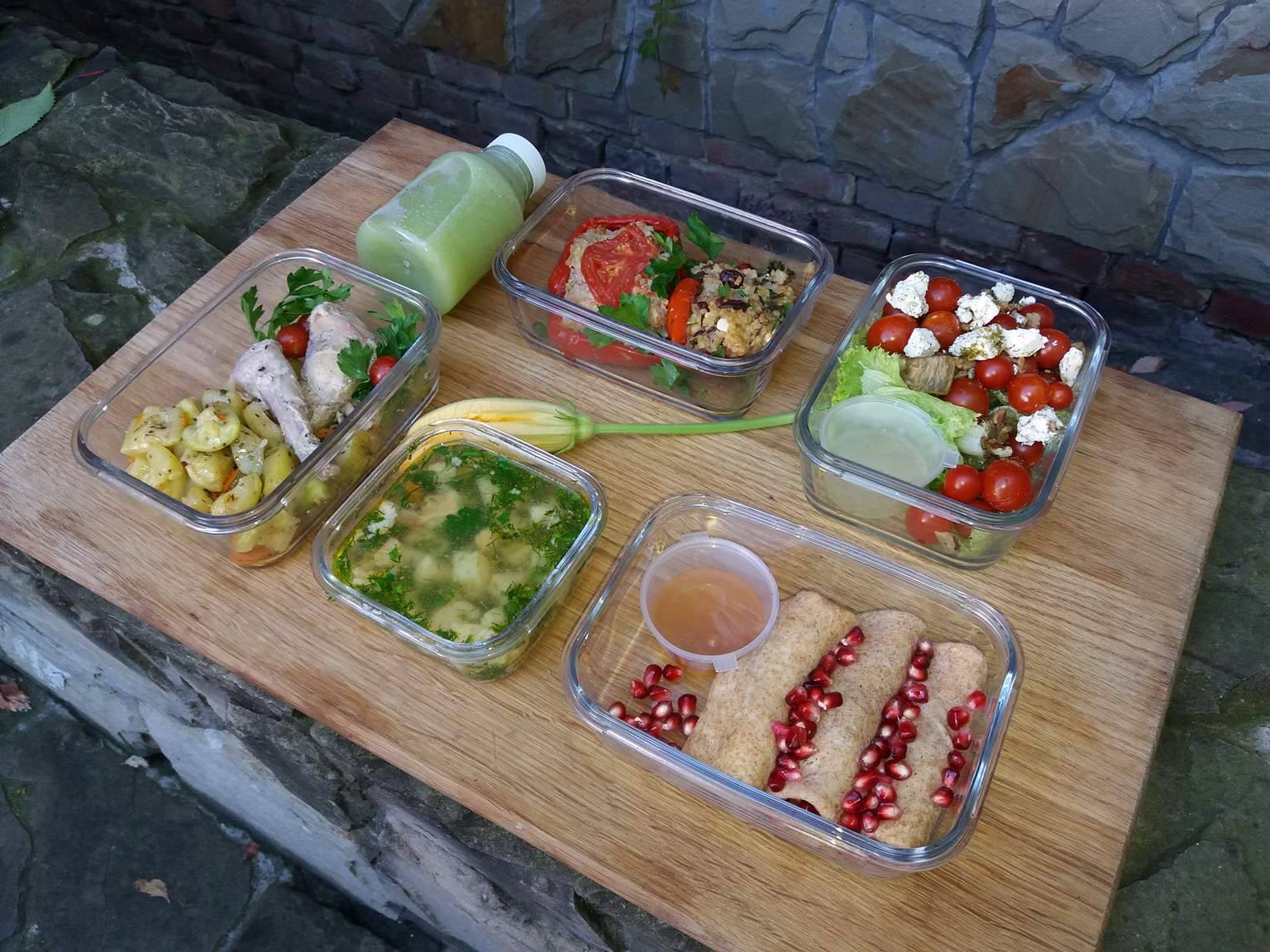
Food delivery in glass containers from Smart Food Lviv.
The Ukrainian Alliance of Zero Waste believes that rejecting excess plastic is more timely than ever — both in Ukraine and the world. This is the preservation of limited natural resources and monetary resources, which is especially relevant in martial law conditions. It is also about creating new jobs, preventing the deterioration of climate change, the path to green European integration, and economic benefits for communities. At the same time, Ukraine should be the flagship of the changes it demands from the EU. This concerns the rejection of Russian oil and gas and, respectively, the products produced from these resources.
The role of the state in these matters is to develop effective mechanisms that would influence the change in the waste management system, not only plastic but in general all types of solid waste — bio-waste, hazardous waste, etc. in establishing rules for all stakeholders and implementing a system of transparent control and monitoring the fulfillment of the above obligations. It is important to create such conditions when the transition to reusable systems will benefit business. Then, disposable plastic will slowly leave the market.
This can be done by establishing obligations and incentives to encourage the transition to multiple uses. These may include, for example, imposing restrictions on the use of single-use packaging and ensuring the availability of alternatives, setting targets for packaging reuse, and so on.
Businesses, in accordance with the principle of extended producer responsibility (EPR), must be responsible for the packaging produced and released to the market and create conditions for the transition to reusable packaging: offer reusable packaging instead of disposable packaging, provide a discount when the customer comes with their own cup, etc.
Currently, it is important in Ukraine to adopt the draft law on packaging and packaging waste, which regulates the manufacturer's responsibility for the packaging produced and released to the market. "This document must necessarily include mechanisms for stimulating the implementation of container reuse systems," says Olha Bilonizhka, the Ukrainian Zero Waste Alliance program manager. In addition to establishing reuse goals, in parallel, it is worth imposing restrictions on certain single-use products made of plastic. In EU countries, this is done by a separate legal document — the Single-Use Plastic Directive. Ukraine is called to do this with the draft law "On preventing the negative impact of plastic products on the environment." As of March 14, 2024, it is in the status of "removed from consideration".
Sydorenko adds that at the same time, it is essential to set up waste management systems and those that will prevent the generation of waste:
"For example, systems for reusing and filling containers. Such solutions already exist on the Ukrainian market and show their effectiveness, stimulating the return of containers for refilling, reducing the amount of waste, and increasing the number of jobs. Our goal is to make more such solutions."
Will it definitely work?
Eco-activists are convinced that to change the culture of single-use plastic consumption, it is first necessary to create conditions in which single-use packaging will be expensive and scarce.
Experts emphasize that any effective initiative to reduce excess packaging must come from government bodies. These are either central authorities (such an approach worked, particularly in Berlin) or local self-government (an example can be a case from the city of Aarhus, Denmark). Otherwise, these will be isolated business initiatives that, without proper legislative regulation, will not work in the legal field, putting their business at risk.
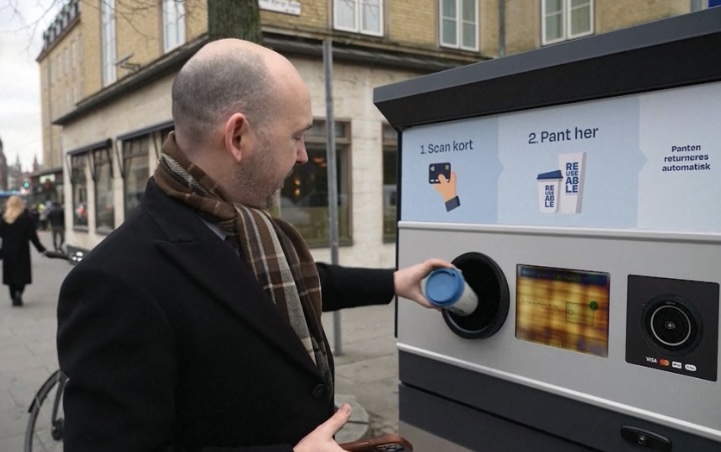
A machine for returning reusable cups in the city of Aarhus, Denmark. For each cup, the user receives €0.67. Screenshot from the DW video
However, such initiatives are necessary to show that the system works and brings economic benefits. In the Czech Republic, there is an initiative MIWA — "minimum waste." It's a system that focuses on "pre-recycling" — reducing consumer waste before purchase. The company delivers staple products such as pasta and legumes to stores in reusable containers, which are then moved to MIWA modular stands. Customers can use the app to order the desired amount of products and pay for the purchase. Customers can pick up orders from the store using reusable containers.
In Great Britain, the supermarket chain Morrisons tested a reusable system for dairy products. Local dairy farms delivered bottles of milk directly to supermarkets, and after consumers returned the containers, manufacturers collected them, disinfected them, and returned them to use. Under these conditions, the bottles can be reused for at least ten years. After receiving positive feedback, the Morrisons company undertook to reduce the primary plastic packaging of its own brand by 50% by 2025.
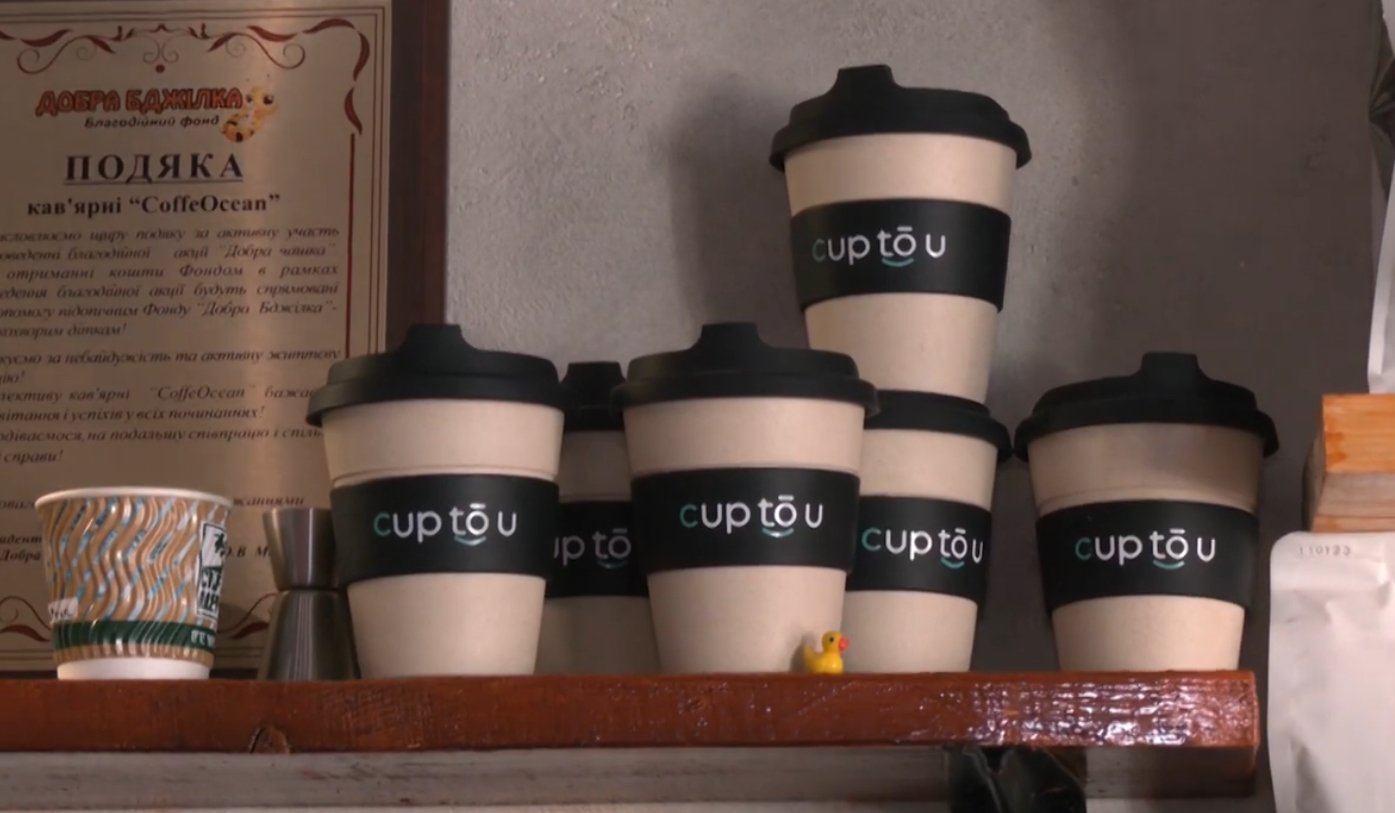
Reusable cups of the Ukrainian eco-initiative Cup to You, Odesa.
There are also cases of reuse in Ukraine. For example, the Zero Cup and Cup to You container service projects work in Lviv and Odesa. In coffee shops participating in the project, you can rent a reusable cup for about $2.5, return it, and get your money back. In Lviv, you can order food delivery from Smart Food Lviv in a reusable glass container.
Even more useful solutions!
If you want to reduce your own plastic waste, make it a habit to:
- use a reusable water bottle;
- take reusable fabric bags to the store;
- avoid additionally packaged food products (in film or disposable bags). For example, pre-cut fruits, vegetables, and intermediate goods;
- cook at home instead of ordering takeout, which often contains extra plastic packaging;
- go on a long trip — take a travel set of cutlery and reusable dishes with you;
- use soap (bars) instead of liquid in plastic bottles;
- buy products at markets and local organic stores, where the vast majority of options are without packaging;
- initiate changes at your workplace — if your office still uses disposable cups, it's time to buy a batch of cups;
- let your favorite single-use businesses know that you want a "single-use plastic-free" option — say, your favorite candies, fruit roll-ups, creams, etc. can be filled into glass containers by manufacturers to be reused in the future;
- refill your container in stores that offer this option.
Newsletter
Digest of the most interesting news: just about the main thing







